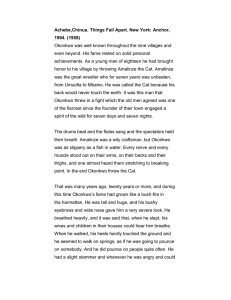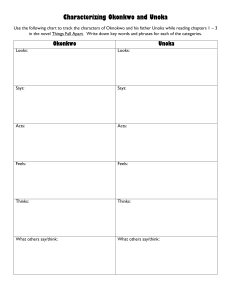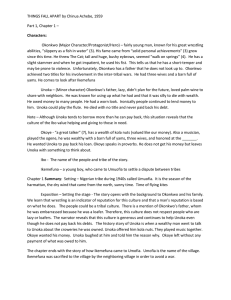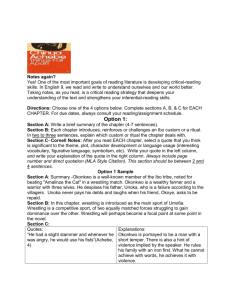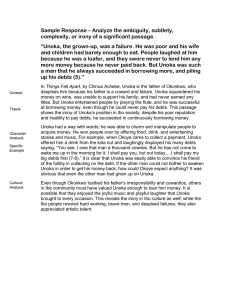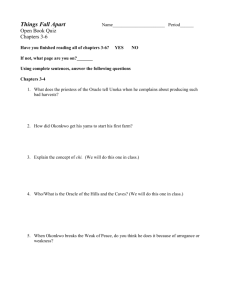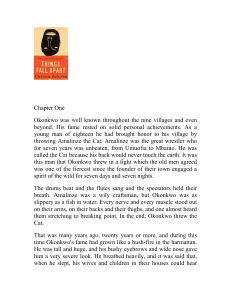Exemplar Stories – Things Fall Apart Achebe, Chinua. Things Fall
advertisement
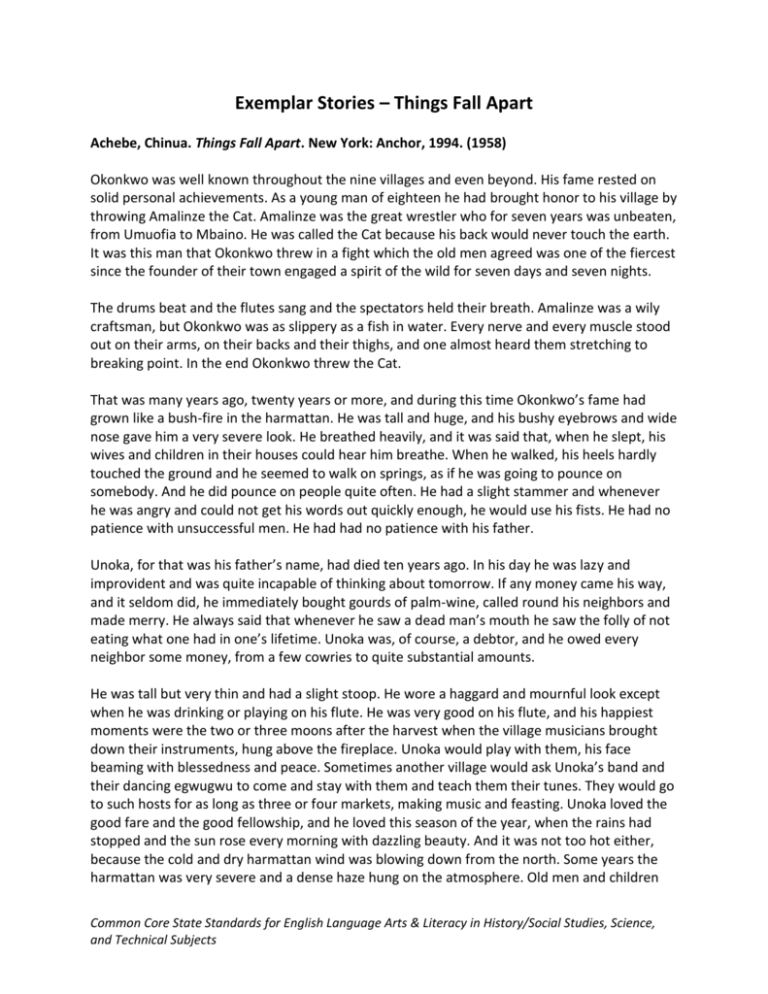
Exemplar Stories – Things Fall Apart Achebe, Chinua. Things Fall Apart. New York: Anchor, 1994. (1958) Okonkwo was well known throughout the nine villages and even beyond. His fame rested on solid personal achievements. As a young man of eighteen he had brought honor to his village by throwing Amalinze the Cat. Amalinze was the great wrestler who for seven years was unbeaten, from Umuofia to Mbaino. He was called the Cat because his back would never touch the earth. It was this man that Okonkwo threw in a fight which the old men agreed was one of the fiercest since the founder of their town engaged a spirit of the wild for seven days and seven nights. The drums beat and the flutes sang and the spectators held their breath. Amalinze was a wily craftsman, but Okonkwo was as slippery as a fish in water. Every nerve and every muscle stood out on their arms, on their backs and their thighs, and one almost heard them stretching to breaking point. In the end Okonkwo threw the Cat. That was many years ago, twenty years or more, and during this time Okonkwo’s fame had grown like a bush-fire in the harmattan. He was tall and huge, and his bushy eyebrows and wide nose gave him a very severe look. He breathed heavily, and it was said that, when he slept, his wives and children in their houses could hear him breathe. When he walked, his heels hardly touched the ground and he seemed to walk on springs, as if he was going to pounce on somebody. And he did pounce on people quite often. He had a slight stammer and whenever he was angry and could not get his words out quickly enough, he would use his fists. He had no patience with unsuccessful men. He had had no patience with his father. Unoka, for that was his father’s name, had died ten years ago. In his day he was lazy and improvident and was quite incapable of thinking about tomorrow. If any money came his way, and it seldom did, he immediately bought gourds of palm-wine, called round his neighbors and made merry. He always said that whenever he saw a dead man’s mouth he saw the folly of not eating what one had in one’s lifetime. Unoka was, of course, a debtor, and he owed every neighbor some money, from a few cowries to quite substantial amounts. He was tall but very thin and had a slight stoop. He wore a haggard and mournful look except when he was drinking or playing on his flute. He was very good on his flute, and his happiest moments were the two or three moons after the harvest when the village musicians brought down their instruments, hung above the fireplace. Unoka would play with them, his face beaming with blessedness and peace. Sometimes another village would ask Unoka’s band and their dancing egwugwu to come and stay with them and teach them their tunes. They would go to such hosts for as long as three or four markets, making music and feasting. Unoka loved the good fare and the good fellowship, and he loved this season of the year, when the rains had stopped and the sun rose every morning with dazzling beauty. And it was not too hot either, because the cold and dry harmattan wind was blowing down from the north. Some years the harmattan was very severe and a dense haze hung on the atmosphere. Old men and children Common Core State Standards for English Language Arts & Literacy in History/Social Studies, Science, and Technical Subjects would then sit round log fires, warming their bodies. Unoka loved it all, and he loved the first kites that returned with the dry season, and the children who sang songs of welcome to them. He would remember his own childhood, how he had often wandered around looking for a kite sailing leisurely against the blue sky. As soon as he found one he would sing with his whole being, welcoming it back from its long, long journey, and asking it if it had brought home any lengths of cloth. Common Core State Standards for English Language Arts & Literacy in History/Social Studies, Science, and Technical Subjects
